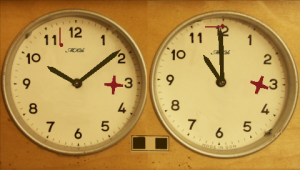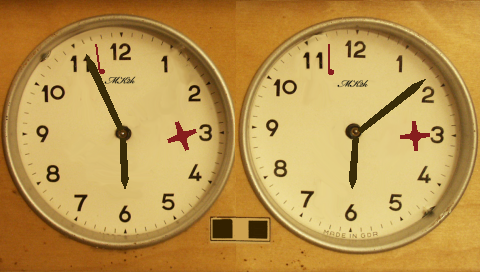| Chess Clock PSP | |
|---|---|
 | |
| General | |
| Author | MK2k |
| Type | Other |
| Version | 1.1 |
| License | Mixed |
| Last Updated | 2008/12/02 |
| Links | |
| Download | |
| Website | |
Chess Clock aka Game Clock PSP is an Analogue Chess/Game Clock Simulation for the Playstation Portable.
It is developed in C++, using Phoenix Game Engine (PGE) by InsertWittyName and MK2k.
Features
- Two connected clocks.
- Each clock containing:
- Big clock pointer.
- Small clock pointer.
- Flag.
- Star-shaped wheel for activity indication.
- 2D physics simulation on the flags.
- The pointers are rotating by an estimated angle velocity, so this app does not feature the most accurate clocks on the planet (it may vary by some seconds per hour).
Installation
Copy the ChessclockPSP folder to ms0:/PSP/GAME/.
User guide
The star-shaped wheel indicates the following:
- Wheel stands still - The current clock is stopped and inactive.
- Wheel spinning Counterclockwise - The current clock is active and running in realtime.
- Wheel spinning Clockwise (twice the speed) - The current clock is being rewound or fast-forwarded.
Use the app for Chess
Playing chess with a game clock has been established since 1861 where sand clocks were used back then. In 1866 a match was played where the referee used stop watches. In 1883 a mechanical game clock was introduced which contained two separated clocks, each being activated/deactivated by a movable bar.
In 1899 H. D. B. Mejer proposed the use of a small flag which falls when the player's time runs out. So this app here uses the ideas of chess enthusiasts more than 100 years ago.
You can play different variants on chess with a game clock. The default setting is:
- Everyone's time runs out at exactly 6 o'clock.
- Everyone's time is run out, when the flag falls.
The standard use is:
- On start of the match, the opposite player of the one doing the first move presses the Shoulder Button on the PSP facing his side to start the first player's clock.
- When a player finishes his move, he presses the Shoulder Button on the PSP facing his side, this stops his own clock and immediately starts the opponent's one. In chess tournaments the hand which actually does the move is the same hand which triggers the Shoulder Button after that.
Chess Clock PSP can be used to play Sudden Death, a varient of Chess where each player gets a fixed amount of time for the whole match (usual amounts are 45 or 30 minutes for a standard match can play a Blitz Chess/Speed Chess is usually played with 5 minutes for each player).
Other variants are better implemented on a Digital Clock simulation.
Use the app for Poker Tournaments
In Poker Tournaments the Blinds are raised after a certain amount of time. No problem for the Game Clock simulation.
Rewind one of the clocks or even both to the time setting of your likes and let it go until the flag falls, then the Blinds will be raised, the clock gets rewound and so on.
Use the app as a Stop Watch
The clock pointers of the simulation aren't exactly accurate, so you should not measure events where seconds count. But you can use the app for cooking an egg without being worried.
Controls
L - Activate and start the right clock, stop the left clock
R - Activate and start the left clock, stop the right clock
D-Pad Down - Stop both clocks
D-Pad Left - Rewind the currently active clock, if no clock is active both clocks get rewound at the same time (keep D-Pad Left pressed for increased speed)
D-Pad Right - Fast-Forward the currently active clock, if no clock is active both clocks get fast-forwarded at the same time (keep D-Pad Right pressed for increased speed)
Triangle - Screenshot
Screenshots

Media
How to Use Classic Analog Chess Clock (Chess House)
Compatibility
This software comes as Release for 3.xx Custom Firmwares.
Changelog
1.1
- Ported from JGE++ to the Phoenix Game Engine (PGE).
- Some graphical glitches on Slim PSPs and FW 4.xx+ resolved.
- Enhanced accuracy.
1.0
- Initial Release.
- Analogue simulation working as expected.
Credits
Big Thanks go to:
- The guys at ps2dev.org for the inoffical PSP SDK.
- InsertWittyName for our work with PGE.
- Tyranid for PSPLinkUSB.
- Slembcke for Chipmunk Game Physics.
Big Shouts go to:
- Everyone at #psp-programming on freenode.
- Kojote at pdroms.de.
- Greg at psp-hacks.com.
- Shoesy and the whole crew at pspsource.de.
- Zerlh of BrainWank.